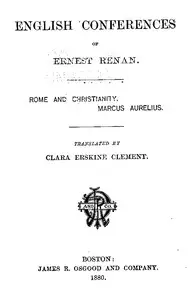"The Life of Jesus" by Ernest Renan is a historical biography that looks at the life of Jesus Christ and his big effect on our history, religious ideas, and the start of Christianity. Written in the late 1800s, the book mixes historical research with a writing style that portrays Jesus as complicated, sculpted by the world he lived in. It starts by looking at how religious beliefs changed over time, leading to a new faith with Jesus at the center. It claims Jesus's life and lessons marked a major change in religious history, helping people move from old beliefs to a deeper understanding of spirituality and the story will try to capture what it was like to be human during Jesus's time, showing just how much he changed things.

The Life of Jesus
By Ernest Renan
Witness the times and life that molded Jesus Christ and his huge impact on a world ready for a spiritual revolution.
Summary
About the AuthorJoseph Ernest Renan was a French Orientalist and Semitic scholar, writing on Semitic languages and civilizations, historian of religion, philologist, philosopher, biblical scholar, and critic. He wrote works on the origins of early Christianity, and espoused popular political theories especially concerning nationalism, national identity, and the alleged superiority of White people over other human "races". Renan is known as being among the first scholars to advance the debunked Khazar theory, which held that Ashkenazi Jews were descendants of the Khazars, Turkic peoples who had adopted the Jewish religion and allegedly migrated to central and eastern Europe following the collapse of their khanate.
Joseph Ernest Renan was a French Orientalist and Semitic scholar, writing on Semitic languages and civilizations, historian of religion, philologist, philosopher, biblical scholar, and critic. He wrote works on the origins of early Christianity, and espoused popular political theories especially concerning nationalism, national identity, and the alleged superiority of White people over other human "races". Renan is known as being among the first scholars to advance the debunked Khazar theory, which held that Ashkenazi Jews were descendants of the Khazars, Turkic peoples who had adopted the Jewish religion and allegedly migrated to central and eastern Europe following the collapse of their khanate.

















